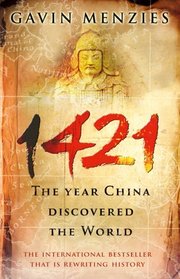I recently read one of Ben Bova's science fiction novels, JUPITER. In this novel, a group of scientists on a research station orbiting Jupiter embark on a mission to determine if there is life on the great planet. The commander of the station is Chinese and names the space probe that will go to Jupiter, the Zheng He. The commander explains to the crew that Zheng He was a 15th century Chinese admiral who commanded seven expeditionary treasure voyages to Southeast Asia, South Asia, West Asia, and East Africa from 1405 to 1433. According to legend, his larger ships carried hundreds of sailors on four decks and were almost twice as long as any wooden ship ever recorded. Although I hadn't really heard much else about Zheng, I remembered that I had this book, 1421, on my shelves for several years and that it related that Zheng and other Chinese admirals supposedly explored much more of the world. Anyway, I decided to read the book and draw my conclusions from it.
1421 is a very well-researched book and unequivocally states that the Chinese explored and colonized much of the world from 1421-1423. Menzies asserts that the records of these voyages were destroyed by the Chinese Emperor based on a self-imposed isolation from the world after the destruction of the Forbidden City in Beijing by fire. The book propounds that four Chinese fleets circumnavigated the world and were comprised of more than 800 vessels containing both sailors and concubines. These fleets charted the world and supposedly passed these charts and maps on to Portugal. The charts were then used by European explorers including Columbus, Dias, da Gama, and Magellan. According to the book, the Chinese sailors and concubines settled in Malaysia, India, Africa, North and South America, Australia, New Zealand, and other islands in the Pacific. The fleets went as far as Antarctica in the South and around Greenland in the North.
Menzies does use some somewhat compelling evidence in his research including maps that predated Columbus, stone carvings from various locations around the world, DNA evidence showing that native in various locations have Chinese DNA, etc. But how much of this is true? Looking on line, I have found many people who debunk Menzies claims and some compare him to Erich von Däniken and his claims of ancient aliens who colonized the earth.
Overall, I found this book to be very interesting although it was sometimes repetitious. I confess that I skimmed a lot of the last chapters of the book. But in my opinion, based on what is known about Zheng He and the Chinese treasure fleets, it could be feasible that the fleets could have gone much further than records show. But if Menzies theories are somewhat accurate, why haven't mainstream historians and scientists latched onto this possibility and further developed it? Overall, I would mildly recommend this but whether or not it is true is left up to the reader.
1421 is a very well-researched book and unequivocally states that the Chinese explored and colonized much of the world from 1421-1423. Menzies asserts that the records of these voyages were destroyed by the Chinese Emperor based on a self-imposed isolation from the world after the destruction of the Forbidden City in Beijing by fire. The book propounds that four Chinese fleets circumnavigated the world and were comprised of more than 800 vessels containing both sailors and concubines. These fleets charted the world and supposedly passed these charts and maps on to Portugal. The charts were then used by European explorers including Columbus, Dias, da Gama, and Magellan. According to the book, the Chinese sailors and concubines settled in Malaysia, India, Africa, North and South America, Australia, New Zealand, and other islands in the Pacific. The fleets went as far as Antarctica in the South and around Greenland in the North.
Menzies does use some somewhat compelling evidence in his research including maps that predated Columbus, stone carvings from various locations around the world, DNA evidence showing that native in various locations have Chinese DNA, etc. But how much of this is true? Looking on line, I have found many people who debunk Menzies claims and some compare him to Erich von Däniken and his claims of ancient aliens who colonized the earth.
Overall, I found this book to be very interesting although it was sometimes repetitious. I confess that I skimmed a lot of the last chapters of the book. But in my opinion, based on what is known about Zheng He and the Chinese treasure fleets, it could be feasible that the fleets could have gone much further than records show. But if Menzies theories are somewhat accurate, why haven't mainstream historians and scientists latched onto this possibility and further developed it? Overall, I would mildly recommend this but whether or not it is true is left up to the reader.
For all the hype, this book was very disappointing. As an archaeologist and biological anthropologist, I found it to be interesting, but scientifically inaccurate.




